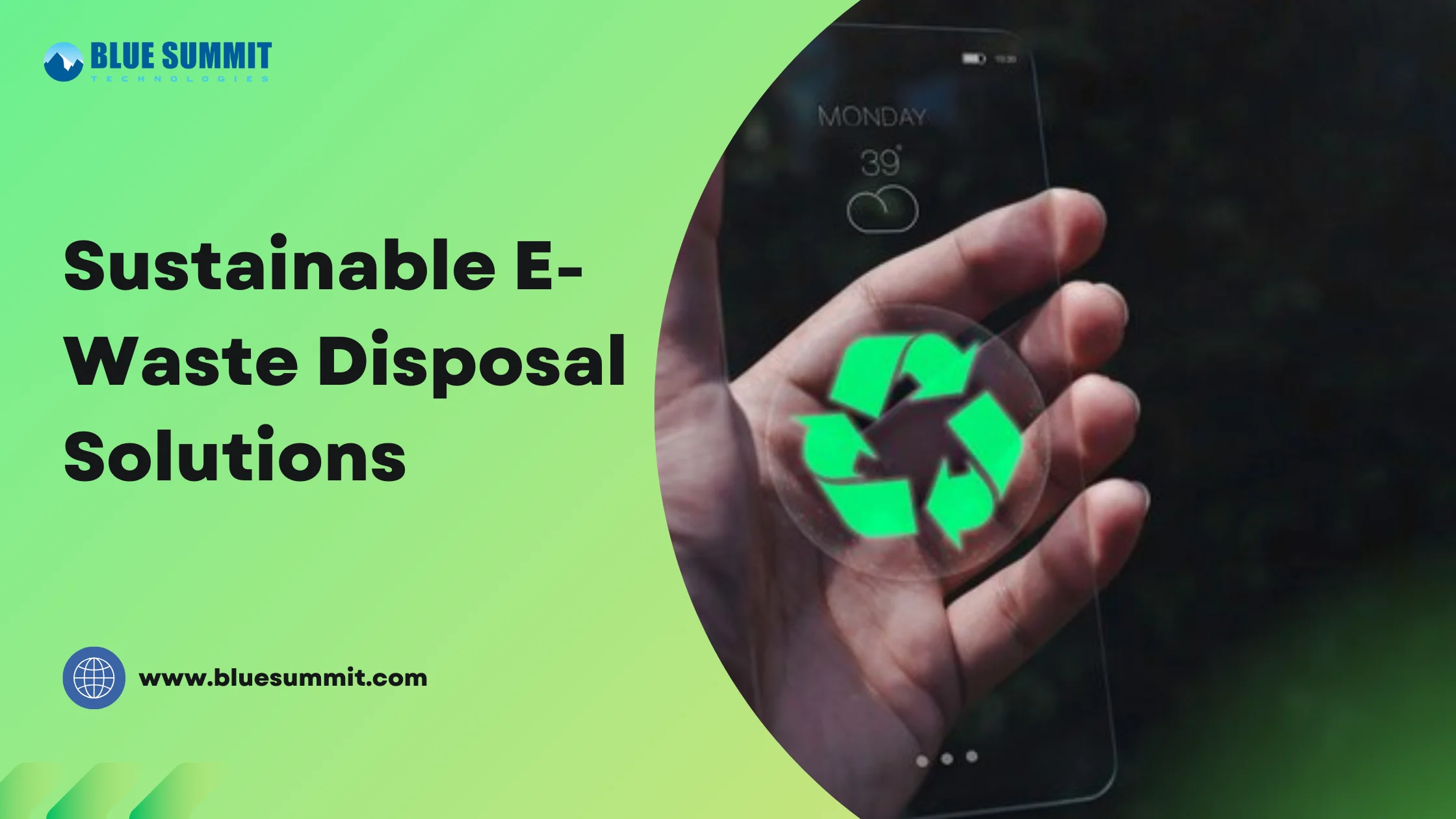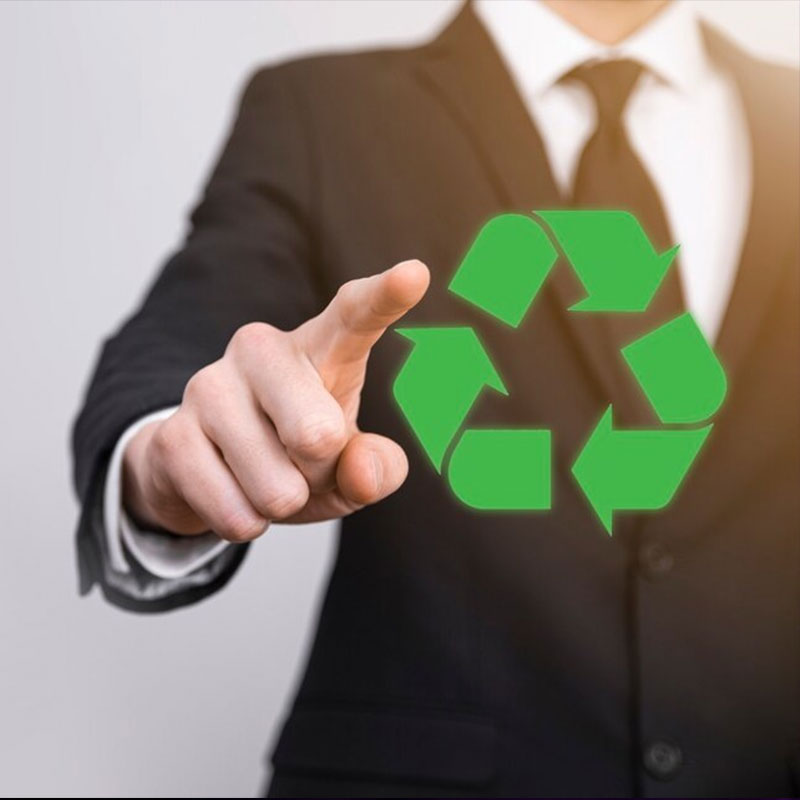
Posted on Friday, Nov 17th, 2023
Sustainable E-Waste Disposal Solutions
In our rapidly evolving technological landscape, electronic devices play a pivotal role in our daily lives. However, the flip side of this technological advancement is the increasing challenge of electronic waste, or e-waste. Sustainable e-waste management has become a pressing global concern, urging individuals and businesses to adopt responsible practices for electronics recycling and disposal. In this blog, we'll delve into the importance of sustainable e-waste management, exploring the role of electronics recycling centers, proper e-waste disposal methods, and the significance of e-waste collection points.
The Escalating Impact of Electronic Waste
With the constant evolution of technology, the lifespan of electronic devices is shrinking, leading to an exponential increase in e-waste. Improper disposal of electronic devices can result in environmental pollution, as these devices often contain hazardous materials such as lead, mercury, and cadmium.Key Challenges of E-Waste
1. Environmental Hazards
The hazardous materials in electronic devices pose a significant threat to the environment when not disposed of properly.2. Resource Depletion
Electronics contain valuable resources such as gold, silver, and rare earth metals. Inadequate recycling means these resources go to waste.3. Data Security Risks
Improper disposal of devices may expose sensitive data, posing security risks to individuals and organizations.Hubs for Responsible Disposal
Electronics recycling centers play a crucial role. These centers are equipped to handle the recycling and disposal of various electronic devices, ensuring that valuable materials are recovered, and hazardous substances are handled safely.The Role of Electronics Recycling Centers
1. Safe Disposal of Hazardous Materials
They follow strict protocols to safely handle and dispose of hazardous materials found in electronic devices.2. Resource Recovery
Recycling centers employ advanced technologies to recover valuable resources from electronic devices, reducing the need for new mining activities.3. Data Destruction Services
Many recycling centers offer secure data destruction services to ensure that sensitive information is not compromised during the disposal process.A Responsibility for Individuals and Businesses
This begins at the individual and business level. Adopting responsible practices is essential to minimize the environmental impact of electronic devices reaching the end of their life cycle.Best Practices for Proper E-Waste Disposal
1. Research Local Recycling Options
Identify nearby electronics recycling centers or collection points that accept a wide range of electronic devices.2. Wipe Data Before Disposal
For personal devices, ensure that all data is wiped securely before disposing of them to protect sensitive information.3. Donate or Sell Functional Devices
Consider donating or selling functional devices to extend their lifespan and reduce e-waste.Making Disposal Convenient
E-waste collection points are designated locations where individuals and businesses can drop off their electronic devices for proper disposal. These collection points are strategically placed to make responsible e-waste disposal convenient for everyone.Benefits of E-Waste Collection Points
1. Accessibility
These are easily accessible, encouraging more people to participate in responsible disposal practices.2. Community Engagement
Collection points foster community engagement, raising awareness about the importance of e-waste management.3. Efficient Handling
Designated collection points streamline the process of collecting and transporting electronic devices to recycling centres.Corporate Responsibility in Action
Many businesses and manufacturers are recognizing their role. These are initiatives undertaken by these entities to responsibly manage the disposal of electronic devices.Components of Recycling Programs
1. Take-Back Programs
Manufacturers may offer take-back programs, allowing consumers to return old devices for recycling when purchasing new ones.2. Extended Producer Responsibility (EPR)
EPR programs make manufacturers responsible for the end-of-life disposal of their products, encouraging them to design products with recycling in mind.3. Corporate Recycling Partnerships
Businesses may establish partnerships with recycling centers to ensure the proper disposal of electronic devices used within their operations.A Global Imperative
As the issue of e-waste transcends geographical boundaries, various international organizations and initiatives have been established to address the global challenge of electronic waste.International Initiatives for E-Waste Management
1. The Basel Convention
An international treaty that aims to control the transboundary movement of hazardous waste, including electronic waste.2. Global E-Waste Statistics Partnership
A collaborative effort to improve the quality and availability of global e-waste statistics to inform policies and initiatives.3. Circular Economy Initiatives
Many countries are adopting circular economy principles, emphasizing the need to design products with a focus on reuse, repair, and recycling.The Way Forward: A Collective Responsibility
It is not solely the responsibility of recycling centers, businesses, or governments—it is a collective responsibility that starts at the individual level. As consumers of electronic devices, we must be conscious of our role in the life cycle of these products and make informed choices for their disposal.Individual Actions for Sustainable E-Waste Management
1. Educate Yourself
Stay informed about the e-waste management options available in your locality and choose responsible disposal methods.2. Support Recycling Initiatives
Opt for products from manufacturers that actively participate in e-waste recycling programs and initiatives.3. Advocate for Responsible Practices
Spread awareness about the importance of responsible e-waste disposal within your community and workplace.How Blue Summit Supports E-Waste Management?
Blue Summit is at the forefront of e-waste management, offering comprehensive solutions that span electronics recycling centers, proper e-waste disposal, e-waste collection points, responsible electronics disposal, electronic waste recycling programs, and safe electronic waste disposal. Here's how Blue Summit can be your strategic partner in promoting a greener, more responsible future.1. Establishing State-of-the-Art Electronics Recycling Centers
Blue Summit leverages its expertise in sustainable technology to design and implement cutting-edge recycling centers. Our solutions focus on efficient processing and recycling, ensuring minimal environmental impact and maximum resource recovery.2. User-Friendly Platforms for Proper E-Waste Disposal
We develop intuitive digital platforms that empower individuals and businesses to engage. Blue Summit's user-centric interfaces, built using the latest technologies, make these disposal accessible and hassle-free.3. Mapping E-Waste Collection Points for Accessibility
Using advanced mapping technologies, Blue Summit creates dynamic systems that identify and optimize these points. This ensures a well-connected network, making it convenient for the community to responsibly dispose of their electronic devices.4. Promoting Responsible Electronics Disposal Practices
Blue Summit's commitment to responsible electronics disposal is evident in our development of solutions that encourage and enforce environmentally friendly practices. We integrate features that guide users in making sustainable choices throughout the disposal process.5. Empowering Electronic Waste Recycling Programs
Our expertise in this programs enables us to build digital platforms that streamline program management. From tracking to reporting, Blue Summit ensures that these initiatives are efficient, transparent, and contribute to a circular economy.6. Ensuring Safe Electronic Waste Disposal Protocols
Safety is paramount in e-waste management. Blue Summit employs the latest security measures within our solutions to guarantee safe electronic waste disposal. From data security to secure transaction processes, we prioritize the protection of sensitive informationConclusion
Sustainable e-waste management is a critical aspect of our journey towards a more environmentally conscious and responsible future. By understanding the significance of electronics recycling centers, e-waste disposal practices, and the role of e-waste collection points, we can collectively contribute to minimizing the environmental impact of electronic devices.By choosing Blue Summit as your e-waste management partner, you're not just investing in technology; you're embracing a commitment to sustainability. Our solutions empower businesses, communities, and individuals to participate actively in responsible e-waste management practices, making a positive impact on the planet.
Blue Summit has collaborated with OdiTek Solutions, a frontline custom software development company. It is trusted for its high service quality and delivery consistency. Visit our partner's page today and get your business streamlined.
REFER TO OTHER RELEVANT CONTENTS

Sustainable E-Waste Disposal Solutions
In our rapidly evolving technological landscape, electronic devices play a pivotal role in our daily lives. However, the flip side of this technological advancement is the increasing challenge of electronic waste, or e-waste. Sustainable e-waste management has become a pressing global concern, urging individuals and...
read more
Recycling
A necessary stage of the IT asset lifetime is the retirement of underutilized or outdated assets. Failure to properly dispose of IT equipments can have implications for your operations, data, the environment, and a messy work-place. Get a “Recycling Certificate” as a part of IT Equipment disposal process.
read more







